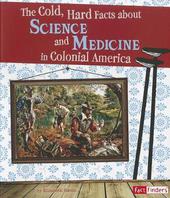
|
Cold, Hard Facts About Science and Medicine in Colonial America (Life in the American Colonies)
Paperback / softback
Main Details
| Title |
Cold, Hard Facts About Science and Medicine in Colonial America (Life in the American Colonies)
|
| Authors and Contributors |
By (author) Elizabeth Raum
|
| Physical Properties |
| Format:Paperback / softback | | Pages:32 |
|
| Category/Genre | History of science |
|---|
| ISBN/Barcode |
9781429672153
|
| Classifications | Dewey:509.7309033 |
|---|
| Audience | |
|---|
| Illustrations |
Maps; Illustrations, color; Illustrations, black and white
|
|
Publishing Details |
| Publisher |
Capstone Press
|
| Imprint |
Capstone Press
|
| Publication Date |
1 July 2011 |
| Publication Country |
United States
|
Description
Travel back to a time when: No one knew what germs were or that they made you sick. People believed the moon had magical powers. Step into the lives of the colonists, and learn the cold, hard facts about science and medicine in colonial America.
Author Biography
Elizabeth Raum has written over two-dozen nonfiction books for young readers, including a biography of Louis Armstrong for Capstone Press. Over the years, she has worked as a middle school and high school English teacher, an elementary school librarian, and a college library director. Elizabeth Raum has written many nonfiction books for children. Two of her Capstone You Choose books, Orphan Trains: An Interactive History Adventure (2011) and Can You Survive Storm Chasing? (2012), are Junior Library Guild selections. Elizabeth lives in Michigan with her husband, Richard.
Reviews"Getting lost" in history is our wish for young researchers, and students will do just that in this series. They will find plenty of information included in fact boxes, primary source materials, maps, photos, drawings, and paintings. The series consistently shows what is familiar and foreign to the modern reader; respectfully incorporates how slavery and minority groups were treated and integrated in American colonial life; and outlines gender and generational roles. Each volume progresses chronologically, beginning with first European settlers and concluding in the mid-1700s. Because of the descriptions of familiar topics set historically, kids will make an instant connection. Useful not only for history, but science, social studies, and other classes, students will enjoy comparing their life to early colonists. Recommended.-- "Library Media Connection"
|